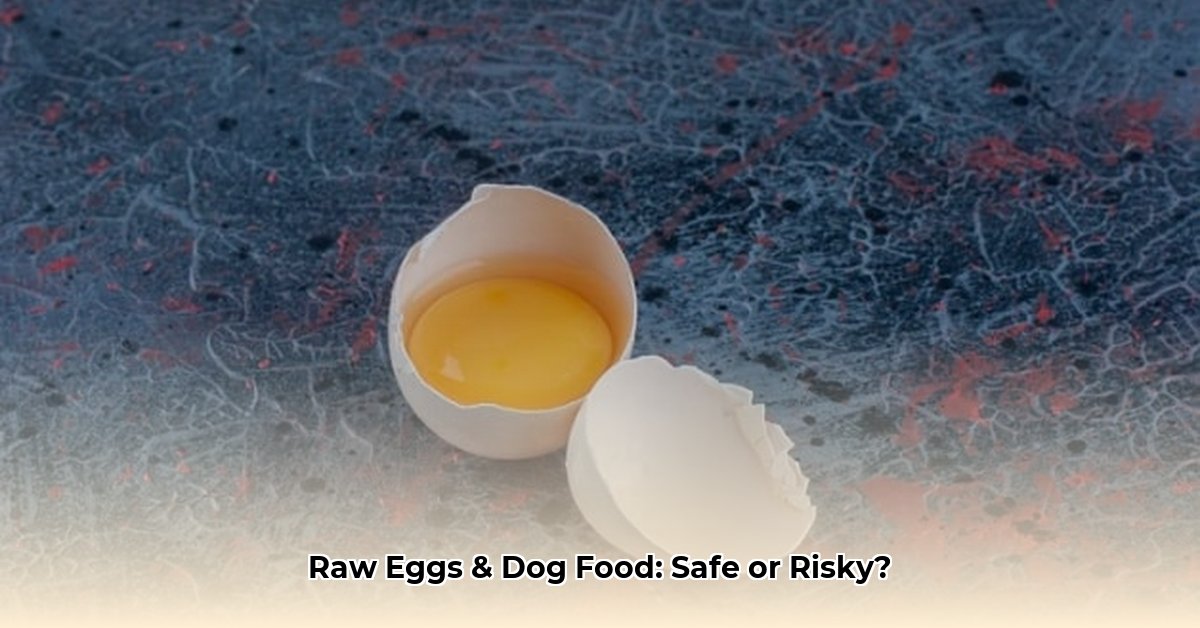Raw Eggs for Dogs: Benefits vs. Risks
Thinking of adding a raw egg to your dog’s food? Many pet owners consider it, believing it’s a natural and healthy boost. However, raw eggs carry potential risks, especially from Salmonella. This guide explores the benefits and risks of feeding raw eggs to dogs, offering safer alternatives and emphasizing the importance of consulting your veterinarian.
Debunking the Raw Egg Myth
Many believe raw eggs offer superior nutrition for dogs, envisioning a diet closer to their wild ancestors. While raw eggs contain protein, fats, and vitamins, the potential dangers outweigh these benefits.
Salmonella Risk
The most significant risk is Salmonella contamination. This bacteria can cause gastrointestinal upset in dogs, ranging from mild discomfort to severe illness requiring veterinary care. Humans, especially children, the elderly, and those with weakened immune systems, are also at risk.
Biotin Deficiency
Raw egg whites contain avidin, a protein that binds to biotin (vitamin B7). This makes biotin unavailable to your dog, potentially causing skin problems, a dull coat, and other health issues.
Potential Benefits (and Safer Alternatives)
Raw eggs do offer nutritional value, including protein, essential fatty acids, vitamins A and B12, and minerals like selenium. However, these nutrients are available without the risks through cooked eggs.
Risks of Raw Eggs in Detail
Salmonella Prevalence and Symptoms
Salmonella can be present in many raw eggs. Symptoms in dogs include vomiting, diarrhea, lethargy, fever, and decreased appetite. Severe cases can be life-threatening, particularly for puppies, senior dogs, or those with compromised immune systems.
Biotin Deficiency Explained
Avidin in raw egg whites tightly binds to biotin, preventing its absorption. Biotin is crucial for healthy skin, coat, metabolism, and cell growth. A deficiency can lead to dermatitis, hair loss, and other health problems.
Safe Practices (If Choosing Raw Eggs – Not Recommended)
If you choose to feed raw eggs, exercise extreme caution:
- Sourcing: Choose organic, free-range eggs from reputable local farms to minimize (but not eliminate) contamination risks.
- Handling: Wash your hands thoroughly after handling raw eggs and sanitize all surfaces they touched.
- Frequency: Limit raw eggs to a very small portion of your dog’s diet.
- Monitoring: Watch for signs of illness (vomiting, diarrhea, changes in behavior).
Healthier Alternatives to Raw Eggs
Cooked eggs (boiled, scrambled, poached) are the safest and most nutritious option. Cooking eliminates Salmonella risk and neutralizes avidin.
Other alternatives for boosting protein and essential nutrients include:
- High-quality commercial dog food: Many already contain safely prepared egg products.
- Lean meats, poultry, and fish: Excellent sources of protein and essential nutrients.
- Certain vegetables: Offer protein and other vital nutrients.
Addressing Specific Concerns
- Puppies and Senior Dogs: Their immune systems are more vulnerable to Salmonella. Always consult your veterinarian before feeding them raw eggs.
- Allergies: If your dog has allergies, consult your veterinarian before introducing eggs (raw or cooked) into their diet.
The Importance of Veterinary Consultation
Always consult your veterinarian before making significant dietary changes for your dog. They can tailor recommendations based on your dog’s breed, age, health status, and individual needs.
Frequently Asked Questions
- Can I feed my dog eggshells? Eggshells contain calcium but can be a choking hazard and may carry Salmonella. Consult your veterinarian about safer calcium supplements.
- How many cooked eggs can I give my dog? Moderation is key. A few times a week is generally safe for healthy adult dogs, but consult your vet for specific recommendations.
- What are the signs of Salmonella poisoning in dogs? Symptoms include vomiting, diarrhea, lethargy, fever, and decreased appetite. Contact your veterinarian immediately if you suspect Salmonella.
Conclusion: Prioritizing Your Dog’s Safety
While raw eggs might seem like a natural treat, the risks associated with Salmonella and biotin deficiency outweigh the benefits. Cooked eggs and other safe alternatives offer the same nutritional value without the hazards. Prioritize your dog’s health and well-being by making informed dietary choices, always consulting with your veterinarian for personalized guidance. Current research suggests that the potential risks of raw eggs make cooked eggs a much safer option.
- Leak-Proof Glass Food Containers with Locking Lids Keep Food Fresh - February 3, 2026
- Glass Storage Containers With Glass Lids That Lock for Freshness - February 2, 2026
- Locking Glass Food Storage Containers for Organized and Fresh Meals - February 1, 2026










